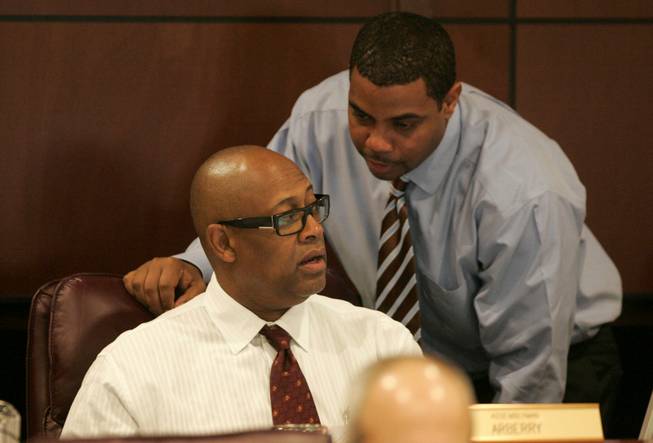
Assemblyman Morse Arberry, D-Las Vegas, left, confers with Senate Majority Leader Steven Horsford, D-Las Vegas, during a meeting of the Interim Finance Committee in Carson City Tuesday, Feb. 3, 2009.
Wednesday, June 29, 2011 | 2 a.m.
CARSON CITY — Money is the fuel that powers politics, with laws providing a distinct line to divide campaign dollars that fund political mailers and campaign signs, and a politician’s personal pocketbook.
Former Assemblyman Morse Arberry was hit with six felony counts Friday, accusing him of crossing that line, by depositing $120,000 in campaign contributions into his personal bank account.
Such episodes inevitably prompt cynicism about who controls the political system and why people run for office in the first place. In this case such a public response is warranted.
Here are three reasons why:
1. Campaign fundraising is unsavory at best
Politicians running for office spend their days “dialing for dollars,” soliciting money from well-heeled individuals, corporations and labor unions to pay for their campaign.
Seen in the most positive light it’s a necessary evil because candidates only want to serve the public and are paragons of moral rectitude but need money to mount a credible campaign.
For their part, campaign donors simply want to elect quality people and are not interested in any quid pro quo for supplying donations to the candidate.
The positive-light scenario also assumes the candidate gets nothing more out of the job than a sense of satisfaction for serving the public, an ego stroke and a bad-to-decent paycheck.
Given that all politicians — even honest ones — need such donations, money equals influence. One politician said when faced with a tough decision: “It’s easier to piss off your constituents than it is your campaign donors.”
If politicians are in it for self-gain — as Arberry is accused — and not public service and the bad-to-decent paycheck, then it tilts the system even more to the advantage of the moneyed donor and not the public.
2. Vague laws, less transparency
Nevada candidates have used contributions for “personal use,” although never to this extent.
Some lawmakers have used campaign money to pay for housing in Carson City during legislative sessions. Others have justified buying suits, food and health insurance with the funds.
State law says that “it is unlawful for a candidate to spend money received as a campaign contribution for the candidate’s personal use.”
But the law does not define personal use — an omission, whether intentional or not, that has made enforcement difficult.
Former Assemblywoman Kathy McClain used campaign money to buy into her public employee health benefits while serving in the Legislature.
Secretary of State Ross Miller argued that health insurance can’t be paid for by campaign contributions. And in April 2010 he reached an agreement with McClain, calling for her to donate that money to charity.
Miller concluded, however, that candidates can use campaign dollars for rent while serving in Carson City.
And the line gets still fuzzier when one examines campaign finance reports.
Take credit card bills, for example. They are regularly reported as miscellaneous campaign expenses, with no questions from the media or enforcers on whether those expenses were legitimate. The secretary of state’s office doesn’t have the manpower to follow up.
One lobbyist said that if Arberry had reported the contributions and rang up the charges on his credit card, no one would have been the wiser.
Cause for optimism, though: Legislation was passed this year requiring candidates to file campaign finance reports online. That will make the information easier to scrutinize.
3. People say they knew about it
Innuendo and rumors about Arberry’s campaign fundraising have circulated over the past few years.
“Have you found anyone who’s surprised?” was a typical reaction to the charges against Arberry.
Lobbyists had noticed some of their campaign donations to Arberry never showed up on his campaign finance reports but were unwilling to come forward with allegations.
Lawmakers also said they noted the low contribution totals Arberry reported, which they said might reflect the funneling of contributions to a personal account.
“This was widely suspected for years,” one legislative source said. “It’s shocking that it took so long.”
The donors whose checks Arberry is accused of depositing into his personal account are the savvy power elite of the state, from gaming to mining to labor and the major lobbying forms.
Some might not have known that he didn’t report their contributions. But all of them?
In the end, it seems that the source who dropped a dime on Arberry was not a contributor, but an “outside law enforcement agency” that handed the information to an investigator in the secretary of state’s office.

Join the Discussion:
Check this out for a full explanation of our conversion to the LiveFyre commenting system and instructions on how to sign up for an account.
Full comments policy